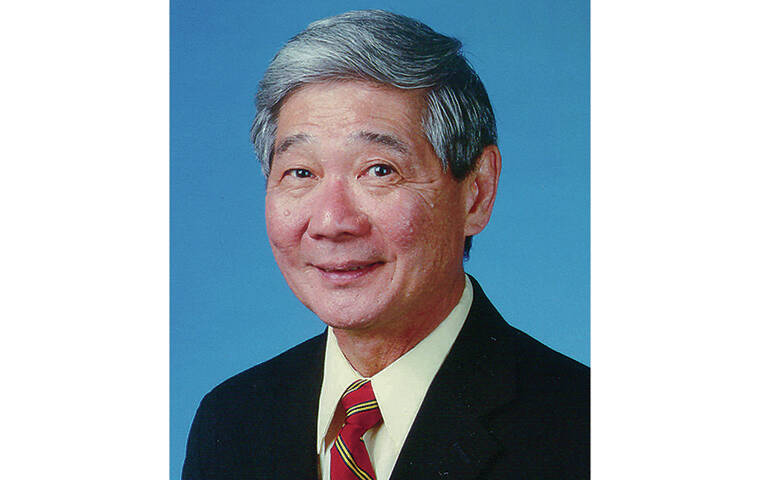Franklin Odo, a third- era Japanese American, famend scholar, historian, activist and pioneer of Asian American research, died Sept. 28.
Odo, 83, was the primary Kaimuki High School graduate to attend Princeton University and made vital contributions to the fields of Asian American and ethnic research all through the nation. He additionally acquired each the President’s Award of the Japanese American Citizens League and an award from the Organization of Chinese Americans in 2008, and the Association for Asian American Studies Lifetime Achievement Award in 2012.
Odo was born May 6, 1939, in Honolulu — the oldest sibling amongst his two sisters and brother. His dad and mom owned a common retailer through the Depression. But when World War II ended, his dad and mom determined to change into farmers, in response to Odo’s son, Jonathan.
Odo spent a lot of his youth farming and caring for his youthful siblings, whom he usually cooked for. He loved sports activities and was notably happy with having been an Eagle Scout, Jonathan Odo mentioned.
After graduating from Kaimuki High School, Odo accomplished his bachelor’s diploma in Asian research earlier than happening to Harvard to finish his grasp’s diploma in East Asian regional research. He then returned to Princeton to finish his doctoral diploma in Japanese historical past.
In his early profession Odo taught at a handful of schools in Los Angeles whereas advocating for the creation of extra Asian American research and ethnic research applications and departments. He moved again to Oahu when the University of Hawaii at Manoa established its ethnic research program in 1978, when Odo took on the function as this system’s first director.
From there, Odo served two years as president of the Association for Asian American Studies and was a board member after which chair of the Hawaii State Foundation on Culture and the Arts for a number of years. In the Nineties he additionally held visiting professorships on the University of Pennsylvania, Hunter College, Columbia University and Princeton University.
From 1997 to 2010, Odo served as founding director of the Smithsonian Asian Pacific American Program in Washington, D.C., and have become the primary Asian Pacific American curator on the National Museum of American History. He additionally spent a yr as interim chief of the Asian Division on the Library of Congress earlier than resuming instructing at Amherst College.
From 2015 till his dying, Odo taught at Amherst College, the place he labored with college students and colleagues to greater than double the variety of professors and programs providing Asian Pacific American research. Amherst College’s not too long ago fashioned Asian American Alumni Fellowship Network has since introduced a senior thesis prize in Odo’s title.
Those who knew Odo say that his advocacy and mentorship are large components of his legacy.
“He liked to share what he knew and help other people learn things,” mentioned his good buddy Chris Conybeare. “Even though he could be very firm as an activist or an advocate, it never came across as arrogance. … He was firm about it, but he was welcoming to you and your ideas.”
Throughout his life Odo volunteered his time with quite a few organizations, together with the 1882 Foundation, Asians United to Raise Awareness and the Honolulu Chapter of the Japanese American Citizens League. His testimony to the Commission on Wartime Relocation and Internment of Civilians was instrumental in memorializing the Hawaii wartime expertise and guaranteeing its inclusion within the 1988 Civil Liberties Act.
He additionally extra not too long ago suggested the National Park Service on representing the historical past of Japanese incarceration and edited its 2021 theme examine sequence on Asian American and Pacific Islander historic landmarks.
Gerald Kato, an acquaintance of Odo’s and a fellow employees member on the University of Hawaii at Manoa, described the scholar’s work as groundbreaking.
“He was very instrumental in communicating to the rest of the world Hawaii’s history and culture, the diversity of people — Native Hawaiians, Asian Americans from Japan, China, Korea, South Vietnam and across the Pacific,” Kato mentioned. “He had a great appreciation of what the diverse cultures of Hawaii were all about.”
Conybeare and Odo turned quick pals after working collectively on a documentary for a tv program that Conybeare oversaw known as “Rice and Roses.”
“He could transmit this enthusiasm about appreciating hidden history and how you could find it from talking to the people themselves,” Conybeare mentioned. “He helped me learn to appreciate Hawaii’s history and culture, as well as the history and culture of Asian Americans.”
Being father was additionally an vital facet of Odo’s life, Jonathan Odo mentioned. He remembers his father as type, nurturing, instructive, hardworking and at all times encouraging his kids to assume critically on issues.
“It was natural for him to think about trying to connect and interact with people in a way that they really understood,” his son mentioned.
In the months main as much as Odo’s dying, the impacts that he had turned obvious via the neighborhood’s outreach to his household, mentioned his son.
“He really wanted to change the world for the better,” Jonathan Odo mentioned. “That’s a life well lived when you were able to have such a wonderful and profound impact on so many people. And I know that’s something that he really was proud of as well.”
Franklin Odo is survived by spouse Enid, with whom he had simply celebrated 59 years of marriage; sons David and Jonathan; daughter Rachel; brother Alan; and 4 grandchildren.
The household is scheduled to carry a non-public memorial service and asks that in lieu of flowers, individuals contemplate donating to the University of Hawaii Foundation’s Franklin S. Odo Fund to proceed his legacy there.
———
Linsey Dower covers ethnic and cultural affairs and is a corps member of Report for America, a nationwide service group that locations journalists in native newsrooms to report on underneathcoated points and communities.


